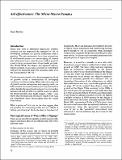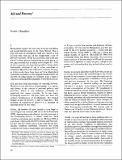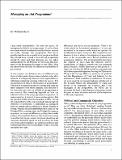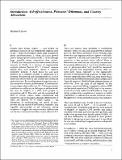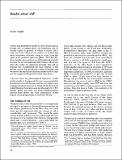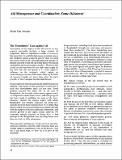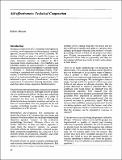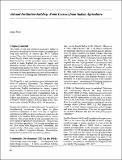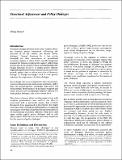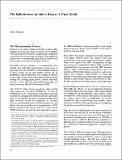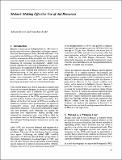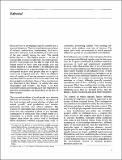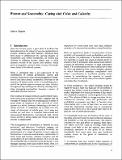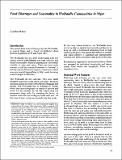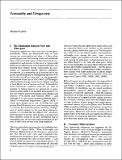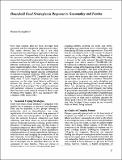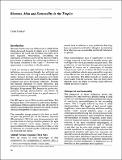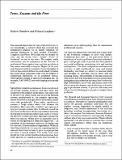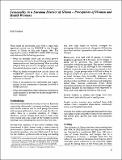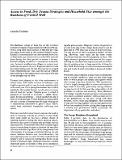1980 - 1989: Recent submissions
Now showing items 281-300 of 430
-
Aid?effectiveness: The Micro?Macro Paradox
(Institute of Development Studies, 01/04/1986)SUMMARY Over the last 20 years measured aid?effectiveness has been high at the project level, in the sense that ex post rates of return are more than satisfactory, but low at the macro level, in the sense that it is ... -
Aid and Poverty
(Institute of Development Studies, 01/04/1986)SUMMARY The volume of aid received by the less developed countries, with some exceptions, is small in relation to the existing scale of poverty in those countries. Aid makes a significant but incremental contribution to ... -
Managing an Aid Programme
(Institute of Development Studies, 01/04/1986)SUMMARY The fundamental purpose of overseas aid is to promote development, but an aid programme serves various purposes and in the UK the Foreign Office and the Department of Trade naturally take a close interest in how ... -
Introduction: Aid?effectiveness, Prisoners' Dilemmas, and Country Allocations
(Institute of Development Studies, 01/04/1986)SUMMARY In theory — and in project and country experience — aid has proved its potential to stimulate growth, and sometimes to reduce poverty. But the record has been worsening, for four reasons. First, donors' self?interest ... -
Doubts about Aid
(Institute of Development Studies, 01/04/1986)SUMMARY Scepticism is expressed in this article about the effectiveness of foreign capital in increasing the level of investment and accelerating growth. Instead it is suggested that capital inflows often depress the ... -
Aid Management and Coordination: Some Dilemmas
(Institute of Development Studies, 01/04/1986)SUMMARY What dilemmas arise in managing aid programmes in poor countries with weak administrative structures and great dependence on external finance? This article considers Bangladesh (1984) and Tanzania (1981–84). Section ... -
Aid?effectiveness: Technical Cooperation
(Institute of Development Studies, 01/04/1986)SUMMARY Based on an extensive review of evaluations of technical cooperation projects in many sectors, this article identifies the reasons for success or failure; strengths and weaknesses of TC planning, coordination and ... -
Aid and Institution?building: Some Lessons from Indian Agriculture
(Institute of Development Studies, 01/04/1986)SUMMARY The impact of foreign aid on Indian agriculture is examined, as a case study of whether aid can assist the cross?cultural transfer of institutions. From early US aid involvement in rural community development in ... -
Structural Adjustment and Policy Dialogue
(Institute of Development Studies, 01/04/1986)SUMMARY This article first looks at the relationship between ‘dialogue’ and ‘conditionality’, the origin of policies about which dialogue is conducted, and the experience of it as practised by donor agencies. It then ... -
The Effectiveness of Aid to Kenya: A Case Study
(Institute of Development Studies, 01/04/1986)SUMMARY This article reviews the effectiveness of official aid to Kenya. Major features include an increase in non?project aid in response to Kenya's economic difficulties of the early 1980s, and an associated intensification ... -
Malawi: Making Effective Use of Aid Resources
(Institute of Development Studies, 01/04/1986)SUMMARY Malawi is perceived by many donors as a ‘virtuous case’ and a relatively effective user of aid. Although many of these perceptions date from the economic boom of the 1970s, performance in recovery from balance of ... -
Editorial
(Institute of Development Studies, 01/07/1986) -
Women and Seasonality: Coping with Crisis and Calamity
(Institute of Development Studies, 01/07/1986)SUMMARY This article explores the contribution of female production, labour and domestic domain services to the management of seasonal stress, crisis and calamity, under the headings: switching tasks and responsibilities ... -
Food Shortages and Seasonality in WoDaaBe Communities in Niger
(Institute of Development Studies, 01/07/1986)Summary Data on WoDaaBe nomadic pastoralists in central Niger demonstrate that seasonality, through a coincidence of stress factors in the dry and transition seasons, clearly does reinforce poverty in this group. Although ... -
Seasonality and Ultrapoverty
(Institute of Development Studies, 01/07/1986)SUMMARY The ultra?poor — a group of people who eat below 80 per cent of their energy requirements despite spending at least 80 per cent of income on food — are most vulnerable to seasonal fluctuations in food supply and ... -
Household Food Strategies in Response to Seasonality and Famine
(Institute of Development Studies, 01/07/1986)SUMMARY Rural families have a range of strategies with which to cope with seasonal and inter?seasonal fluctuations in food supply. For landed households the most important seasonal strategies include choice of cropping ... -
Biomass, Man and Seasonality in the Tropics
(Institute of Development Studies, 01/07/1986)SUMMARY Agricultural research linked to government policies to increase the availability of biomass to provide food, forage and medicine requires a re?think. In particular, by ignoring trees and gathered foods, policies ... -
Trees, Seasons and the Poor
(Institute of Development Studies, 01/07/1986)SUMMARY Trees play a significant role in poor people's seasonal livelihoods: this has been a neglected subject due to interlocking biases against understanding how the poor secure their incomes, and ignorance of the ... -
Seasonality in a Savanna District of Ghana – Perceptions of Women and Health Workers
(Institute of Development Studies, 01/07/1986)SUMMARY Households in a coastal district of Ghana aim to maintain a constant supply of food by farming, fishing and trading. Trading in processed foods is highly competitive in the rainy season. Many families respond to ... -
Access to Food, Dry Season Strategies and Household Size amongst the Bambara of Central Mali
(Institute of Development Studies, 01/07/1986)SUMMARY This article describes the seasonal variation in production and household organisation in a Sahelian farming village. With the loosening of domestic responsibilities, once the harvest is stored, the dry season ...

